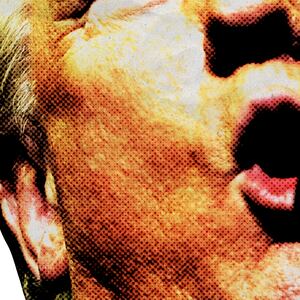What motivates someone to burst into a Southern California synagogue and shoot unarmed worshipers, there to recite the memorial prayer for the dead?
Depends who you ask: progressives say nationalist, racist ideology, while conservatives say hate. The difference may seem slight, but in fact, it’s why right and left talk past one another—and seem to be moving farther apart.
Progressives, and most scholars, regard the kind of anti-Semitism that motivated the Poway shooting as part of the xenophobic, ultra-nationalistic constellations of hatreds and “otherings” that also, in our day, include Islamophobia, racism, and anti-immigrant animus. Jews are the “enemy within,” facilitating the evils of immigration and multiculturalism to destroy the motherland.
This is borne out by what Poway, Pittsburgh, Christchurch, and other white terrorists all said in their manifestos and other online comments. Like thousands of others of ultra-nationalists in Europe and America, they see their white, European cultures being overrun by foreigners. And they believe that Jews are making it happen.
In the words of the Charlottesville white supremacists, “you will not replace us,” a taunt aimed at non-whites, is easily changed to “Jews will not replace us.” That is a political statement—filled with ignorance and hate, of course, but also ideology.
On the right, however, anti-Semitism is regarded as hate, not ideology.
Despite reams and reams of ideological-political writing, from the Protocols of the Elders of Zion forgery to Mein Kampf to the paranoid manifesto of the Poway shooter that allege in precise terms the ways in which Jews destroy the national homeland, conservatives insist that anti-Semitism is simply pure, irrational, timeless, and ahistorical hatred that has nothing to do with any politics whatsoever. It’s the same whether it comes from Pharaoh in Egypt, a Tsarist pogrom, or a Hamas terrorist.
“We forcefully condemn the evil of anti-Semitism and hate, which must be defeated,” President Donald Trump said in response to the Poway shooting.
This definition of anti-Semitism is extraordinarily wrong. It is at odds with what anti-Semites themselves have said since the term was popularized in 1879. It mashes together religious animus, true nationalist anti-Semitism, and resistance to right-wing Zionism. And it is particularly helpful to the very people who exacerbate it, today’s nationalists, for three reasons.
First, of course, it absolves them of any responsibility. To most rational observers, it seems obvious that when Trump spreads lies about the dangers of immigrant crime and Muslim terrorism, he stokes the fires of populist nationalism. In response to that incitement, some will merely wave a flag and don a red hat. But others will take matters into their own hands, striking back at Jews or Muslims or Mexicans.
Some, like Poway shooter John Earnest and Pittsburgh shooter Robert Bowers, may even believe that Trump himself has not gone far enough. They are extending Trump’s logic, not defying it.
Yet if anti-Semitism is merely a pathological hatred and has nothing to do with any ideology, all of this is coincidence. Why did anti-Semitic incidents rise 60 percent in the first year of Trump’s presidency? Well, anti-Semitism is an age-old hatred; no one can explain its pathology, the right says.
Once again, such a denial of causality and reality seems facially absurd, and yet, it is what the likes of Trump, Stephen Miller, Steve Bannon, and their ilk would have us believe. Moreover, since hardly any “mainstream” Republicans have spoken out about Trump’s incitement of hatred, either they believe this delusion as well, or, by refusing to speak, are implicated in the violence that Trump has incited.
Hatred of Jews goes back thousands of years, but the anti-Semitism of John Earnest is a specific, nationalist phenomenon with specific roots and specific myths.
The unmooring of anti-Semitism from ideology has a second benefit for nationalists, which is that it reinforces their own nationalism. In Israel, of course, this is most obvious: everyone hates the Jews, the thinking goes, therefore Jews must be strong and dominant. Force is all the Arabs understand, I remember being taught in Hebrew school, so we have to be stronger than they are.
But even for nationalist parties like those governing Brazil, the United States, and Hungary, anti-Semitism is a convenient reminder that violence and hatred are endemic to the human condition, and strong ethno-nationalism is the only way to fight it.
“We have no choice,” as Trump has said many times.
This is how Israeli Prime Minister Benjamin Netanyahu can find common cause with barely reconstructed anti-Semites like Hungary’s Viktor Orban. It suits Netanyahu fine for Orban to demonize George Soros and other Jews—after all, Netanyahu hates Soros, too. But more broadly, both men are also engaged in the same anti-democratic activities: attacking human rights organizations, enforcing patriotic speech, undermining the independent judiciary and, most importantly, demonizing “foreigners.”
To nationalists, the solution to anti-Semitism is not, as progressives would have it, stamping out bigotry, ultra-nationalism, and scapegoating of the “other,” but rather a strong ethno-nationalist state (Jewish or otherwise). The presence of anti-Semitism serves to reinforce this view. It simply means that we must all be even stronger and more nationalistic.
The third and final function of the uncoupling of anti-Semitism from ideology is perhaps its most important: it enables “anti-Semitism” to be a scourge of left and right alike, rather than a feature of right-wing nationalism. If anti-Semitism is defined simply as anytime someone hates Jews for any reason, then it is a free-floating hatred that finds a home in Palestinian activism, fringe black nationalism, and among Muslim Americans like Rep. Ilhan Omar.
Now, we are told, including by centrists who should know better, that an “ancient hatred” has reappeared on the right and left alike—as if it is campus BDS supporters who are shooting up synagogues and chanting “Jews will not replace us.”
Of course, there are indeed instances of anti-Semitism on the far left, including conspiracy theories involving Jews and slavery, Palestinian propaganda depicting Israelis as drinking blood, and anti-capitalist screeds that call out Jewish financiers in particular (which, of course, a Trump campaign ad also did).
But in the United States, the quality and quantity of these incidents pale in comparison by those found on the right.
Most importantly, there are no left-wing equivalents for the incitement coming from the nationalist right. There is no left-wing equivalent of Trump seeking to ban all Muslims from entering the United States. There is no left-wing equivalent of “Make America Great Again” with its harkening back to a whiter and less equal past. There is no left-wing equivalent of the lies about Mexicans bringing crime, drugs, and rape to America. A single remark that congressional support for Israel is “all about the Benjamins”—a claim applied every day to the NRA, Big Pharma, or the fossil fuel industry—is nothing compared to these violent, constant, and powerful incitements to ultra-nationalist frenzy.
To the right, the Poway shooter has more in common with Ilhan Omar than with the massacre at a Christchurch mosque.
But to the Poway shooter himself, Christchurch was his inspiration. Contrary to the false and exculpatory claims of the right, Islamophobia and anti-Semitism are arms of the same murderous monster, together with ultra-nationalism, hatred of the other, and racism.
And when you agitate one part of that monster, the whole beast rises.









